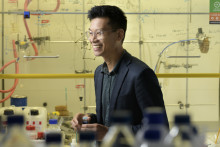Ruchi Bansal is an Assistant Professor at the Department of Biomaterials Science and Technology. Her research focuses on understanding and treatment of liver diseases. ‘These diseases are growing drastically over past years. 25% of people worldwide suffer from alcoholic and non-alcoholic fatty liver diseases. That means one in four people,’ stresses the scientist.
Awareness tent at the Lowlands Festival
‘One of my main goals is to make public aware of the magnitude of the problem and warn them that they should take care of their liver,’ says Bansal. She is planning to reach the public at the Lowlands Festival, where she would like to highlight the issue, offer preliminary predictive tests to the visitors and provide them with advice on how to keep their liver healthy. ‘It’s all about lifestyle. The liver is a self-healing organ, but it is so often damaged due to unhealthy lifestyle: fatty diet, excessive alcohol intake and lack of exercise. With a change of lifestyle, the liver can recover.’
'With a change of lifestyle, liver can recover.'
And it is vital that is does, explains the researcher: 'The liver is the biggest organ in our body and it performs an array of important bodily functions: detoxifying the blood, synthesizing and manufacturing of proteins, metabolizing drugs and secreting the bile that is necessary for digestion. It regulates sugar, fat and protein amounts that enter our bloodstream. Moreover, liver diseases are a starting point for many other health issues, such as diabetes or cardiovascular problems. Unfortunately, many people are not aware of this, because liver diseases are silent diseases.’

New treatment
Ruchi Bansal is, however, very aware of the problem and sees a huge need for new treatment of liver diseases. She is developing novel targeted therapies, some of which are already tested on animals – with promising results. These therapeutic approaches halt and reverse the disease process using drug encapsulated in nanocarriers that reach only specific cells.
To be exact, Bansal and her team have designed liposomes that specifically target inflammatory macrophages, thereby regulate liver inflammation and fibrosis. ‘This technology is patented and clinicians are very excited about the prospect of using it. It offers many great possibilities,’ says the researcher. ‘This technology can be applied in other inflammatory and fibrotic diseases, for instance, lung fibrosis, kidney fibrosis, bowel diseases and inflammation-driven cancers.’
Bringing the therapy to patients
Following additional preclinical studies, Ruchi Bansal plans to start the company TarMac Innovations B.V. to develop these therapies for clinical application. ‘These therapies are highly innovative and there is nothing of this kind on the market. There is a huge potential and big market for these therapies, but what’s most important for me is to treat patients suffering from these devastating diseases,’ she says. However, it will take a few more years before the therapy can reach the clinical practice.
In the meantime, the scientist would like to remind everyone that liver diseases at early stage are self-healing therefore therapies are not required if precautionary measures are taken. ‘Don’t overburden your liver,’ advises Bansal. ‘Keep a healthy lifestyle and don’t overdo it with alcohol.’ What exactly does that mean? ‘Don’t go over 14 units of alcohol a week – that means about six pints of beer or seven glasses of wine. Keep your liver in mind. It’s strange, really,’ adds the scientist. ‘All cigarettes’ packages mention the product is dangerous for your health, but there is never any warning on a bottle.’







